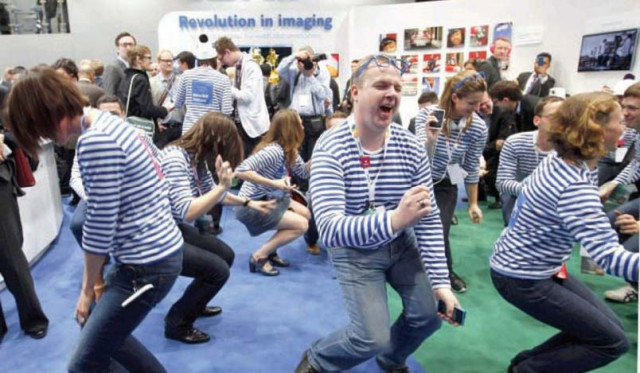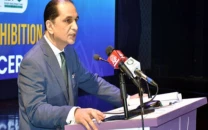Mobile world congress: The future will be lived in loudspeaker mode
Smartphones are giving way to superphones, as mobiles and man intertwine.

The central issue was clear to me at 8:30am on the first day of the Mobile World Congress, the top annual conference for mobile phones and related technology which was held in Barcelona last month.
Hundreds of journalists had assembled in the Nokia hall, at which the Finnish giants would announce their award-winning 41-megapixel camera phone to much fanfare. Before all that we waited mutely, watching a slideshow.
The series of images were all highly likeable – in the Facebook sense. Achingly cool dudes and dudettes were doing fun stuff, from partying to rock-climbing to … posing. The accompanying music was intended to convey adventure, spirituality and connectedness: think Moby in a good mood. The message was clear. These were experiences, this was life and Nokia was the enabler.
The power of mobile as enabler, the consequences of mobile as enabler, were the thrilling issues over the four-day conference.
The first thing to realise was that all the decisive work was being done elsewhere, in tech labs far far away. This place was largely just front and suits.
Around 67,000 people flew in for the conference and most were literally wearing a suit, as most were men. Several booths – there were 1,400 exhibitors – were manned by women, but, as an investment banker from London confirmed, most of these not-quite-models were hired specially for the event. All of this gave the impression that for much of the time this was four days of boys with their toys.
And when boys get to play, they make their own language. In every industry, language takes on a dialect of its own, but because mobiles are penetrating our lives with such intensity, the words matter more. Soon they will be as much a part of our kitchen-table conversations as ‘pass the butter’.
For example, when a Nokia executive says the “mission is to create a third ecosystem”, he is not suggesting a revolutionary programme for tree-planting. What’s more, it is always ‘consumers’, never ‘people’. The forms, however, are very human: the power of narrative obsesses the mobile marketers. I heard at least three execs press home the key point in gaining competitive advantage: “Who is telling the most compelling story?” is what they wanted to know. The best stories will win the most consumers.
The stories at the MWC were varied, as each company elbowed out the other to show they were different, and by extension better.
Asus had their phone which also slots into a tablet, like a docking station. Samsung were highly visible with their Galaxy Note 10.1, setting up marquees in which artists-for-rent drew sketches with their new high-tech pens. Bang & Olufsen had a phone which doubled up as your hi-fi remote, with gesture controls allowing you to change volume or track with a twirl of your fingers. Samsung also revealed their Galaxy Beam, which projects images onto walls, meaning a powerpoint presentation is always there, ready, lingering in your pocket.
Meanwhile, Fujitsu want you to know their phones are waterproof. Employees dropped mobiles in aquariums before taking them out and talking without hindrance. This is not just to protect phones from rain or spilled drinks, by the way, as waterproof phones, one learnt, are a huge market in Japan, where women love to dial in the shower.
Mobiles will also change the way we drive. Bill Ford, the great grandson of Henry Ford, spoke about how we need to view “vehicles on the road the same way we look at smart phones, laptops and tablets – as pieces of a much bigger, richer network.” This was the first time I would hear of ‘artificial intelligence’ but not the last. This is the vision: that more brainy devices will make life easier as they ‘read’ what we like and what we do.
In traffic terms, this can reduce congestion and even, some day, create self-driving cars. The changes will bring about a “fundamental transformation for the future of our children,” said one automobile exec. What those are and who will make them, as I would discover continually, nobody can say for sure.
Medical advancements are another big area for mobiles. Biometrics will be able to diagnose many of our health concerns, with some developers confirming their vision for sci-fi to enter the mainstream – more specifically the bloodstream – with devices under our skin, monitoring our blood pressure and other health indicators.
Less disturbing is the idea of reminders via SMS for vaccinations, ultrasound imaging, and apps alerting others of signs of distress in elderly patients.
Over patatas bravas in one of the conference’s outdoor dining areas, a developer at a leading mobile firm told me that even the size of our hands could change, as man and mobile become interlinked. Leaving aside evolutionary changes which could take millennia, the question of suitable size and form for phones still lingers.
The mobile companies seem torn between tablet and phone; Nokia itself seems to have an actual strategy of blurring the lines between feature phones and smartphones. In short, some think, everything is gradually merging to become one: business and pleasure, friends and strangers, mind and body and mobile.
But prior to all this, there are advances within parameters we already know about. Winner of the MWC’s ‘Best New Mobile Handset, Device, or Tablet’ was the Nokia 808 PureView, for one reason only: its whopping 41 megapixels cameraphone.
The gushing, the whoops, the breathless excitement when Nokia announced the magic 41 number was perhaps the most animated moment of the conference. Nokia are an interesting case study. As they work on their transfer to Windows mobile, the company has essentially started from scratch, building on their history but accepting that they require a whole new approach of innovation to keep up with Apple and the rest.
The Canadian Stephen Elop, the first non-Finn to be CEO of Nokia, said that with “smarter mobile phones and an array of new services, we are demonstrating that we can change the clock speed of Nokia.”
Watching the smiling, confident Finnish duo who did most of the development on the PureView celebrate the launch, he could be right. They look busy; more so, they look like they’re thoroughly enjoying it.
But then, carried away on megapixels, one was also reminded of the outside world. The four-day event brought in more than 300 million Euros to the Catalan economy, but this will not be enough, judging by the violent protests which reached the gates of the MWC on the third day.
Riot police had to be called in as students protested austerity cuts in the education services, a reminder that for a majority of people, none of this matters. In Spain, youth unemployment is at 50%. These people don’t want a smartphone, they want a job.
The executive chairman of Google, Eric Shmidt, was certainly aware of this, reminding the congress in his keynote address that for five out of seven billion humans, “the web is still a scarce resource.”
Yet still, the congress was awed when Spain’s Telefonica operator turned on an LTE network in Barcelona. Fourth generation (4G) technology is imminent and will be based on this LTE technology. Companies realise, however, that the real market expansions are in developing counties, markets such as Pakistan where for most people the digital revolution has not arrived, but may do before the information revolution arrives. One executive foresaw a cashless society, where all our banking, all our transactions, would be mobile.
In 1907, the French writer Charles Peguy said that despite all the miraculous inventions in the communications sphere, “it will always be only the temporal earth … it will always be the carnal earth.”
After the Mobile World Congress, one can no longer say if he was correct. The truth is that neither can the mobile phone makers. Nobody knows anything for certain, other than we are moving, at rapid speed, into an ultra-mobile future.
Published in The Express Tribune, March 19th, 2012.


















COMMENTS
Comments are moderated and generally will be posted if they are on-topic and not abusive.
For more information, please see our Comments FAQ